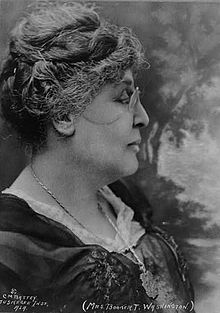Margaret James Murray
| Margaret Murray Washington | |
|---|---|

Washington in 1915
|
|
| Born |
Margaret Murray March 9, 1865 |
| Died | June 4, 1925 (aged 60) |
| Known for | anti lynching activism |
| Spouse(s) | Booker T. Washington |
Margaret Murray Washington (March 9, 1865 - June 4, 1925) was the principal of Tuskegee Normal and Industrial Institute, which later became Tuskegee University. She was the third wife of Booker T. Washington She was inducted into the Alabama Women's Hall of Fame in 1972.
Margaret Murray was born on March 9 in Macon, MS in the early 1860's. Her birth year is unknown as her tombstone says she was born in 1865, but the 1870 census lists her birth year as 1861. She was one of ten children born to sharecroppers. Her father was of an Irish immigrant. Her mother was an African American washerwoman and possibly a former slave. Her father died when she was seven, and the next day she moved a Quaker couple by the name of Sanders. They encouraged her to become a teacher, one of the few occupations available to women at the time.
As a child Murray spent much of her time reading and quickly excelled in school. By the age of fourteen, she was so advanced in her studies that the school offered her a teaching position. Determined to further her teaching career, at the age of nineteen, Murray enrolled in Fisk University, where she completed the college preparatory course in five years and college in four.
It was at Fisk that Murray first met Booker T. Washington. Regarding her as a model student, Washington asked her to take over the position of Lady Principal, formerly held by his deceased second wife. By 1890, Murray was writing to Washington to express her deep feelings for him. He proposed the following year and, after some hesitation, Murray accepted Washington's proposal and they were married in 1893. Murray and Washington shared a home with Washington's relatives and his children from his previous marriage until "The Oaks", the homestead which was built for their family was constructed in 1901. Washington was reluctant to share his feelings with Murray, and often left her to tend his children while he was away on business. Though Washington never got over the loss of his first two wives, he believed that Margaret provided a well-ordered household, and the two were generally happy with their marriage. Margaret wrote Washington's speeches and she helped her husband in expanding the school and traveled with him on his tours and speaking engagements.
...
Wikipedia
